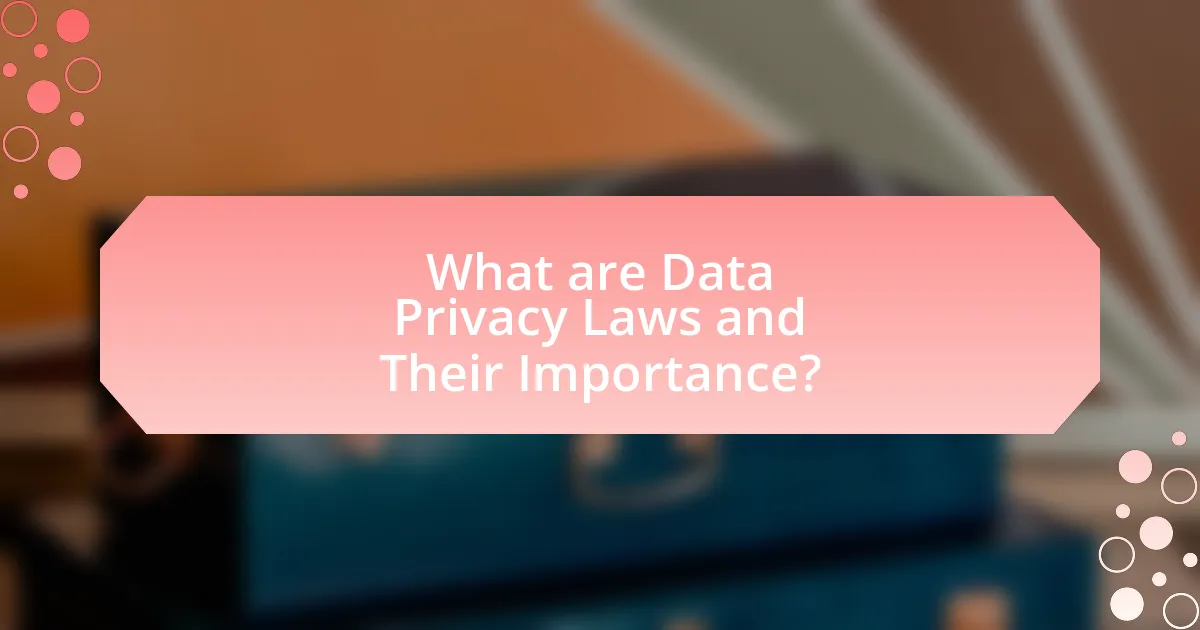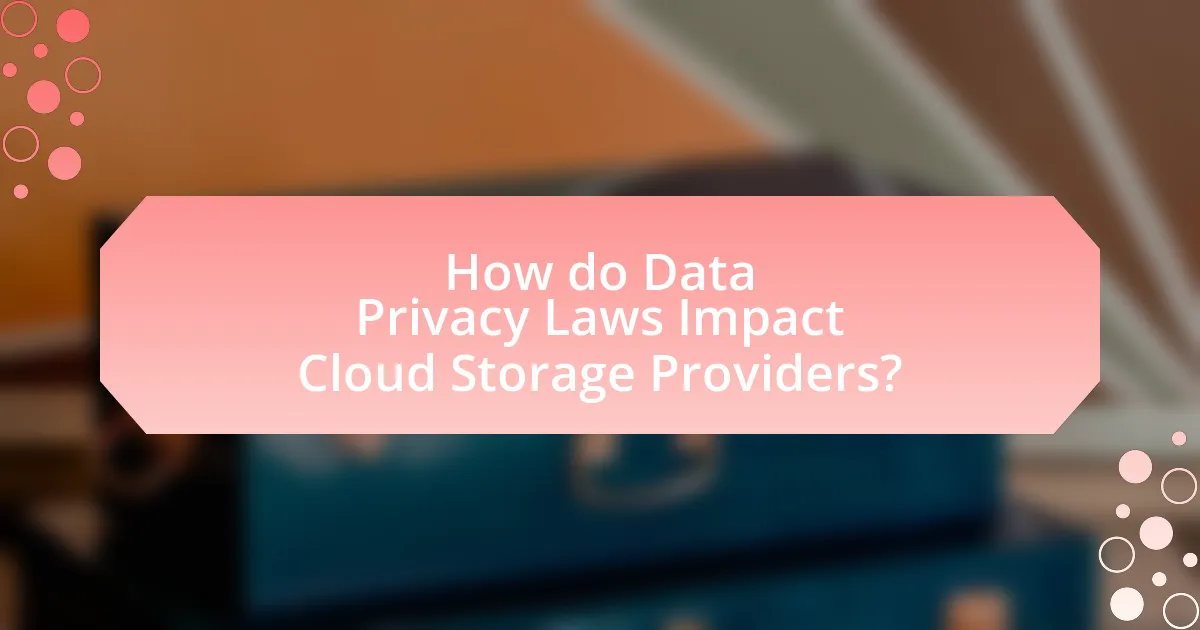Data privacy laws are regulations that govern the collection, storage, and use of personal information by organizations, playing a critical role in protecting individuals’ privacy rights. This article examines the impact of these laws, particularly the General Data Protection Regulation (GDPR) and the California Consumer Privacy Act (CCPA), on cloud storage providers. It discusses the key principles of data privacy laws, the legal liabilities faced by providers, and the compliance strategies necessary to mitigate risks associated with data breaches. Additionally, the article explores future trends in data privacy regulations and their implications for cloud storage practices, emphasizing the importance of user consent, transparency, and robust security measures.
What are Data Privacy Laws and Their Importance?

 |
|
Data privacy laws are regulations that govern the collection, storage, and use of personal information by organizations. These laws are crucial because they protect individuals’ rights to privacy and control over their personal data, ensuring that organizations handle this information responsibly and transparently. For instance, the General Data Protection Regulation (GDPR) in the European Union imposes strict guidelines on data processing and grants individuals rights such as access to their data and the ability to request its deletion. The importance of these laws is underscored by the increasing prevalence of data breaches and misuse of personal information, which can lead to identity theft and loss of consumer trust.
How do Data Privacy Laws affect businesses?
Data privacy laws significantly affect businesses by imposing regulations that govern the collection, storage, and processing of personal data. These laws, such as the General Data Protection Regulation (GDPR) in Europe, require businesses to implement strict data protection measures, obtain explicit consent from individuals for data usage, and ensure transparency in their data handling practices. Non-compliance can result in substantial fines; for instance, GDPR violations can lead to penalties of up to 4% of a company’s global annual revenue. Consequently, businesses must invest in compliance strategies, including staff training and data management systems, to mitigate risks associated with data breaches and legal repercussions.
What are the key principles of Data Privacy Laws?
The key principles of Data Privacy Laws include transparency, purpose limitation, data minimization, accuracy, storage limitation, integrity and confidentiality, and accountability. Transparency mandates that organizations inform individuals about data collection and usage practices. Purpose limitation restricts data processing to specific, legitimate purposes. Data minimization requires that only necessary data be collected. Accuracy emphasizes the need for data to be kept up-to-date and correct. Storage limitation dictates that data should not be retained longer than necessary. Integrity and confidentiality ensure that data is protected against unauthorized access and breaches. Lastly, accountability holds organizations responsible for complying with these principles and demonstrates compliance through documentation and practices. These principles are foundational to regulations such as the General Data Protection Regulation (GDPR) in the European Union, which enforces strict guidelines on data handling and privacy.
Why is compliance with Data Privacy Laws crucial for organizations?
Compliance with Data Privacy Laws is crucial for organizations because it protects sensitive information and mitigates legal risks. Organizations that adhere to these laws, such as the General Data Protection Regulation (GDPR), avoid substantial fines that can reach up to 4% of annual global turnover or €20 million, whichever is higher. Furthermore, compliance fosters consumer trust, as customers are more likely to engage with businesses that demonstrate a commitment to safeguarding their personal data. This trust can lead to increased customer loyalty and a competitive advantage in the market.
What are the main types of Data Privacy Laws?
The main types of Data Privacy Laws include comprehensive data protection laws, sector-specific laws, and data breach notification laws. Comprehensive data protection laws, such as the General Data Protection Regulation (GDPR) in the European Union, establish broad guidelines for data collection, processing, and storage, ensuring individuals’ rights over their personal data. Sector-specific laws, like the Health Insurance Portability and Accountability Act (HIPAA) in the United States, focus on protecting sensitive information within particular industries. Data breach notification laws require organizations to inform affected individuals and authorities when personal data breaches occur, enhancing transparency and accountability. These laws collectively shape how organizations, including cloud storage providers, manage and protect user data.
How do GDPR and CCPA differ in their approaches?
GDPR and CCPA differ primarily in their scope and enforcement mechanisms. GDPR, applicable to all EU member states, mandates strict data protection measures for any organization handling personal data of EU citizens, emphasizing user consent and data minimization. In contrast, CCPA, which applies to businesses operating in California, focuses on consumer rights regarding personal data, allowing users to opt-out of data selling and requiring transparency about data collection practices. The enforcement of GDPR is backed by significant fines up to 4% of annual global turnover, while CCPA imposes fines of up to $7,500 per violation, reflecting a more lenient approach.
What are the implications of international Data Privacy Laws?
International Data Privacy Laws impose significant obligations on organizations regarding the collection, storage, and processing of personal data across borders. These laws, such as the General Data Protection Regulation (GDPR) in Europe, require companies to implement stringent data protection measures, obtain explicit consent from users, and ensure transparency in data handling practices. Non-compliance can result in hefty fines; for instance, GDPR violations can lead to penalties of up to 4% of a company’s global annual revenue. Consequently, cloud storage providers must adapt their services to comply with these regulations, which may involve enhancing security protocols, conducting regular audits, and ensuring that data transfer mechanisms meet legal standards. This compliance not only protects user data but also builds trust with customers, ultimately influencing market competitiveness.
How do Data Privacy Laws Impact Cloud Storage Providers?

 |
|
Data privacy laws significantly impact cloud storage providers by imposing strict regulations on how they collect, store, and process personal data. These laws, such as the General Data Protection Regulation (GDPR) in Europe and the California Consumer Privacy Act (CCPA) in the United States, require cloud providers to implement robust security measures, obtain explicit consent from users, and ensure data portability and the right to be forgotten. Compliance with these regulations often necessitates substantial investments in technology and processes to safeguard user data, which can affect operational costs and service offerings. For instance, failure to comply with GDPR can result in fines up to 4% of annual global revenue, emphasizing the financial implications of non-compliance for cloud storage providers.
What challenges do Cloud Storage Providers face due to Data Privacy Laws?
Cloud storage providers face significant challenges due to data privacy laws, primarily in compliance and operational costs. Compliance with regulations such as the General Data Protection Regulation (GDPR) requires providers to implement stringent data protection measures, which can be costly and complex. For instance, GDPR mandates that companies ensure data is processed lawfully, transparently, and for specific purposes, leading to increased legal and administrative burdens. Additionally, data localization requirements in various jurisdictions compel providers to store data within specific geographic boundaries, complicating their infrastructure and potentially increasing costs. These challenges are compounded by the need for continuous monitoring and updates to comply with evolving legal standards, which can strain resources and impact service delivery.
How do Data Privacy Laws influence data storage practices?
Data privacy laws significantly influence data storage practices by imposing strict regulations on how organizations collect, store, and manage personal data. These laws, such as the General Data Protection Regulation (GDPR) in Europe, require companies to implement measures that ensure data security, limit data retention periods, and provide individuals with rights over their personal information. For instance, GDPR mandates that organizations must only store personal data for as long as necessary for the purposes for which it was collected, compelling businesses to adopt data minimization strategies and regularly audit their data storage practices to comply with legal requirements.
What are the legal liabilities for Cloud Storage Providers under these laws?
Cloud storage providers face legal liabilities under data privacy laws primarily related to data breaches, unauthorized access, and failure to comply with data protection regulations. For instance, under the General Data Protection Regulation (GDPR), providers can be held accountable for not implementing adequate security measures, resulting in fines up to 4% of annual global turnover or €20 million, whichever is higher. Additionally, the California Consumer Privacy Act (CCPA) imposes penalties for non-compliance, including fines of up to $7,500 per violation. These laws mandate that cloud storage providers ensure the confidentiality, integrity, and availability of personal data, and failure to do so can lead to significant legal repercussions.
What strategies can Cloud Storage Providers implement for compliance?
Cloud storage providers can implement several strategies for compliance with data privacy laws, including adopting robust data encryption, conducting regular audits, and ensuring data residency. Data encryption protects sensitive information both at rest and in transit, making it inaccessible to unauthorized users. Regular audits help identify compliance gaps and ensure adherence to regulations such as GDPR and CCPA. Additionally, ensuring data residency by storing data in specific geographic locations can help meet local legal requirements, as many data privacy laws mandate that personal data be stored within certain jurisdictions. These strategies collectively enhance compliance and mitigate risks associated with data breaches and legal penalties.
How can Cloud Storage Providers ensure data encryption and security?
Cloud storage providers can ensure data encryption and security by implementing end-to-end encryption, which protects data both at rest and in transit. This method involves encrypting data before it is uploaded to the cloud and ensuring that only authorized users have the decryption keys. Additionally, providers can utilize strong encryption standards, such as AES-256, which is widely recognized for its robustness. According to a 2021 report by the Cloud Security Alliance, 93% of organizations consider encryption a critical component of their cloud security strategy, highlighting its importance in safeguarding sensitive information.
What role does user consent play in compliance strategies?
User consent is a fundamental component of compliance strategies, particularly in the context of data privacy laws. It ensures that organizations obtain explicit permission from individuals before collecting, processing, or sharing their personal data, aligning with regulations such as the General Data Protection Regulation (GDPR) and the California Consumer Privacy Act (CCPA). These laws mandate that consent must be informed, specific, and revocable, thereby reinforcing the accountability of cloud storage providers in handling user data responsibly. By integrating user consent into their compliance frameworks, organizations not only mitigate legal risks but also enhance trust and transparency with their users, which is essential for maintaining a competitive edge in the data-driven market.
What are the Future Trends in Data Privacy Laws and Cloud Storage?

 |
|
Future trends in data privacy laws and cloud storage include increased regulatory scrutiny, the rise of data localization requirements, and the implementation of stricter consent mechanisms. Regulatory bodies worldwide are enhancing their focus on data protection, as evidenced by the European Union’s General Data Protection Regulation (GDPR) and similar laws emerging in various jurisdictions. These regulations often mandate that organizations store data within specific geographic boundaries, leading to a surge in demand for localized cloud storage solutions. Additionally, as consumers become more aware of their privacy rights, cloud storage providers will need to adopt more transparent consent processes, ensuring users are fully informed about data usage. This shift is supported by a growing body of research indicating that compliance with data privacy laws can significantly influence consumer trust and business reputation.
How are emerging technologies affecting Data Privacy Laws?
Emerging technologies are significantly influencing data privacy laws by necessitating updates and adaptations to address new challenges posed by advancements such as artificial intelligence, blockchain, and the Internet of Things. These technologies often generate vast amounts of personal data, prompting regulators to revise existing frameworks to ensure adequate protection of individual privacy rights. For instance, the General Data Protection Regulation (GDPR) in Europe has been shaped by the rise of data-driven technologies, establishing stricter consent requirements and data processing standards to safeguard user information. Additionally, the rapid evolution of technology has led to increased scrutiny on data breaches and the responsibilities of organizations, compelling lawmakers to create more robust compliance measures and penalties for violations.
What impact will AI have on data privacy regulations?
AI will significantly influence data privacy regulations by necessitating more stringent compliance measures and adaptive frameworks. As AI technologies process vast amounts of personal data, regulators will likely respond with updated laws to address concerns about data misuse and privacy breaches. For instance, the General Data Protection Regulation (GDPR) in Europe already emphasizes the need for transparency and accountability in data processing, which will be further reinforced as AI systems become more prevalent. Additionally, the rise of AI-driven analytics may prompt regulators to establish clearer guidelines on consent and data ownership, ensuring individuals retain control over their personal information.
How might future legislation change the landscape for Cloud Storage Providers?
Future legislation is likely to impose stricter data privacy regulations on Cloud Storage Providers, fundamentally altering their operational frameworks. For instance, laws similar to the General Data Protection Regulation (GDPR) in Europe have already set a precedent for enhanced user consent and data protection measures, compelling providers to implement more robust security protocols and transparency practices. Additionally, emerging regulations may require Cloud Storage Providers to localize data storage, which could lead to increased operational costs and necessitate changes in infrastructure. These legislative changes aim to protect consumer data rights and enhance accountability, thereby reshaping the competitive landscape among providers who must adapt to comply with evolving legal standards.
What best practices should Cloud Storage Providers adopt for data privacy?
Cloud storage providers should adopt encryption, access controls, and regular audits as best practices for data privacy. Encryption protects data both at rest and in transit, ensuring that unauthorized users cannot access sensitive information. Implementing strict access controls limits data access to authorized personnel only, reducing the risk of data breaches. Regular audits help identify vulnerabilities and ensure compliance with data privacy laws, such as the General Data Protection Regulation (GDPR), which mandates that organizations take appropriate measures to protect personal data. These practices collectively enhance data security and build trust with users.
How can Cloud Storage Providers enhance transparency with users?
Cloud storage providers can enhance transparency with users by implementing clear data usage policies and providing detailed information about data handling practices. This includes offering accessible privacy notices that outline how user data is collected, stored, and shared, as well as the specific rights users have under data privacy laws such as the General Data Protection Regulation (GDPR). Additionally, providers can utilize transparency reports that disclose government requests for data and the provider’s response to those requests, thereby fostering trust. Research indicates that transparency in data practices can lead to increased user confidence and satisfaction, as evidenced by a study published in the Journal of Business Ethics, which found that clear communication about data practices positively impacts user trust and engagement.
What measures can be taken to regularly audit compliance with Data Privacy Laws?
Regular audits of compliance with Data Privacy Laws can be conducted through a combination of internal assessments, third-party evaluations, and continuous monitoring systems. Internal assessments involve reviewing data handling practices, privacy policies, and employee training programs to ensure alignment with legal requirements. Third-party evaluations, such as audits by external firms, provide an objective analysis of compliance and identify potential gaps. Continuous monitoring systems utilize automated tools to track data access and usage, ensuring real-time compliance with regulations. These measures are essential as they help organizations maintain accountability and adapt to evolving legal standards, thereby reducing the risk of non-compliance penalties.


